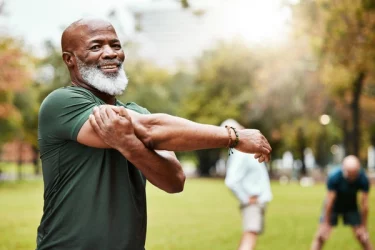Estimated reading time: 4 minutes
We all wish we could go through life with the power of hindsight. It would make us a lot more confident when it comes to decision-making, particularly where health is concerned. But with Wellsoon from Practice Plus Group, one thing you don’t need is hindsight. Not only do we offer specialist hip joint replacement treatment, we’ve also put together this helpful little blog that provides all the answers to what can be a common conundrum for patient’s: what I wish I knew before hip replacement surgery.

Wellsoon self-pay surgery
Choose Wellsoon self-pay surgery from Practice Plus Group. With no hidden costs, you’ll pay less than you might think and be back to your best sooner than you thought.
- Surgery in 4 to 6 weeks*
- No hidden costs
- Flexible finance options
To chat about Wellsoon self-pay surgery options, call our Private Patient Advisors today, on 0330 818 8945. Alternatively, you can email us on privatepatient@practiceplusgroup.com
Waiting times
This, along with cost, is probably the most common question when it comes to hip replacement surgery. There are a lot of factors in play when it comes to NHS waiting times (i.e. location and consultant availability to name a few), but the stated aim is for all hip replacement patients to have their surgery within 18 weeks of their preoperative assessment.
At Wellsoon from Practice Plus Group, private hip replacement waiting times are between four and six weeks.
Pain medication
In less severe cases, it is possible to manage hip pain with over-the-counter medication. These medications range from helpful gels like Voltarol to anti-inflammatory tablets such as Ibuprofen. If you’d like to try pain medication as a way of managing your hip pain, you should consult your doctor first. He or she may be able to recommend a specific brand or type of medication that could prove effective for you.
What to do before total hip replacement surgery
My hip hurts! I guess I’m just going to be laid up in bed, unable to do anything until my surgery, right?
Wrong! In fact, very wrong.
Prehabilitation for surgery is a real thing and taking it seriously can have a profound impact on your recovery. From walking to munching, here are just a few things you can (and should) do before your your hip replacement surgery.
Quit smoking
Still popping outside every few hours for a crafty cigarette? Are you struggling to find other, healthier ways to de-stress? You aren’t alone. According to recent studies, around 60% of the 6.4 million current smokers in the UK actually want to quit. And if you’re scheduled for hip replacement surgery, there’s no better time to finally kick the habit. Because, as has been proven, smoking actively hinders recovery from surgery. It does this in a variety of different ways:
- infections – smokers have an increased likelihood of developing infections at the wound site. This is because they heal at a slower rate than non-smokers
- heart and lung problems – a smoker’s heart and lungs need to work harder, increasing the potential for breathing problems during recovery
- blood clots – smokers have a higher risk than non-smokers of forming blood clots in their legs. These can travel up to the lungs, causing serious issues.
If that hasn’t swayed you into quitting, perhaps the following stat will. Studies have proven that smokers that quit four-to-eight weeks before their surgery can reduce the potential for post-surgery wound complications by half.
Lose weight
If you’re already in tip-top condition – great! Simply move on to the next section. For those that want to lose a few pounds: read on. Not only will losing weight potentially make you eligible for surgery (consultants won’t operate on you if your BMI is over 42), it can also reduce the strain on your joints.
Regular light exercise
This will depend on the amount of pain you’re in. If your pain is manageable, it’s a good idea to stay as active as you can. Walking and swimming will help to strengthen the muscles around the affected joint, as well as getting you out in the fresh air! If light exercise causes you too much pain, have a chat with your doctor to devise an alternative plan.
Eat a healthy diet
This one pretty much goes without saying. The Holy Grail of wellbeing advice, making sure you get enough of the good stuff is essential preparation for surgery. Be sure to eat plenty of fruit and veg, as well as lean proteins and whole grains. Drink plenty of water too to stay hydrated and flush the toxins out of your system.
Pain in your hip?
If you’re experiencing hip pain, try our hip suitability quiz. It will give you an idea of whether you’d benefit from booking an initial consultation with one of our hip specialists.
What should you not do before hip replacement surgery?
If you’ve got a burning desire to jump out of a plane before your hip replacement surgery, we’d generally advise against it. The same goes for skiing, rugby, football – in fact anything that carries a high risk of impact and falling over. Knee replacement patients should also take heed of this advice – you have been warned!
If you’re unsure about what you should and shouldn’t do before your surgery, it’s a good idea to consult a doctor.
What is the artificial hip joint made of?
In the UK, artificial hip joints are typically made from a combination of the following materials:
- metal (titanium or cobalt)
- ceramic
- plastic (Polyethylene).
These all have their different pros and cons and while one might be a great fit for one patient, it may not be the case for another. Your consultant will be able to recommend the best combination of materials for your needs.
What you need at home after hip replacement
Organising your home so that it’s as accessible as possible post-surgery is an essential box to tick when preparing for hip surgery. Think about it: when you leave the hospital, your mobility is likely to be limited. Which means that, for a while, you may not be able to carry out everyday household chores like cooking and cleaning. This is where your friends and family come in. Enlisting their help is a great idea for the days and weeks following your op.
The other main thing to do is to make your house accessible. If your bed is upstairs, it might be a good idea to move it downstairs. Removing trip hazards like loose rugs and chairs could also spare you another trip to the hospital.
Contact your health provider with questions and concerns
If you have any concerns, questions or worries, please don’t hesitate to get in touch.
At Practice Plus Group, we provide patients with a pre-operative assessment to ensure that the procedure is right for you. We’ll explain your treatment and make sure that you are medically fit enough to proceed. It is also your opportunity to meet the team who will care for you and to ask any questions.
What I wish I knew before private hip replacement surgery FAQs
Not quite found the information you’re looking for? Our dedicated FAQs might be able to help!
Straight into the juicy stuff! Most patients will be able to have sex again when their wound has healed and swelling has subsided. This is typically around six weeks after the operation. For those that can’t wait that long, we recommend trying different positions to find which is the most comfortable.
After your surgery, you need to make sure that while sitting, your knees aren’t higher than your hips. This can be an issue when using the toilet so, getting a raised seat or an over-the-toilet commode is pretty essential.
You can drive again when you can comfortably perform an emergency stop with no pain. This is generally around six weeks after your surgery, but does differ from patient-to-patient.







